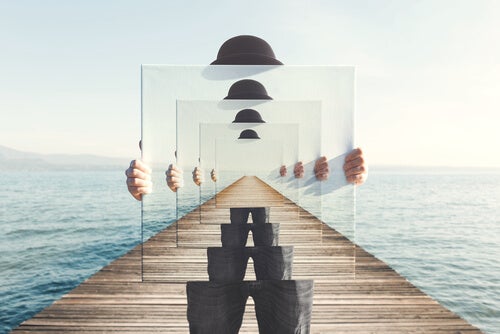Is the Way You Define Yourself Accurate?

Do you think that your family and friends would define you in the same way you define yourself? Is the way you define yourself accurate and objective or is it biased? There’s a very easy way to find out. All you have to do is play a simple game!
The next time you’re with your friends or family, you should each write three characteristics that you think define yourselves and three that define the other people in the room. Do they match? Which are more accurate, what you think of yourself or what others think of you?
This phenomenon occurs due to all the biases we have. Both positive and negative biases direct your life. In other words, positive biases offer an unrealistic or idealized version of reality, while negative biases give you a distorted and pessimist version of reality. An example of a positive bias is thinking that you’re a better driver than you actually are. A negative bias would be thinking that everyone is in better shape than you are.
The important thing to understand is that the way you define yourself affects your mood and how you interact with the world. According to recent studies, people tend to perceive reality with a positive bias and to take in information from things that are already familiar or the most similar to what they already know. Also, you tend to remember your past actions better than they were, your achievements fewer than they actually were, and your mistakes more common.

Types of biases
Many biases come into play when you take in information. Some of the most common and the ones that tend to affect the way you define yourself are:
- Attentional bias. This is when you direct your attention towards positive information about your actions and the way you define yourself.
- Confirmation bias. In this case, you spend your energy trying to confirm the hypotheses that you already have. Consequently, you look for information that either reinforces ideas you already have or that come close to the way you see yourself.
- Self-serving bias. This is when you tend to take all the credit for your successes but consider yourself just a passive spectator of your failures.
- Comparative optimism. This bias is when you tend to think that positive things are more likely to happen to you than to other people or that it’s less likely that negative things will happen to you. This bias is closely related to the next, which is:
- Overconfidence bias. This is when you think that it’s unlikely for bad things to happen to you. Thus, you feel immune or more in control of your life than you actually are.

In what way do your biases affect the way you define yourself?
How can you change something about yourself that you don’t even consider wrong? How can you continue to grow and develop if you can’t see where you’ve failed and the aspects you can improve? It’s easy for people to think that everyone else is responsible for their unhappiness. It’s also easy for them to assume that they know themselves perfectly well. However, in some cases, this can’t be farther from the truth.
What if, instead of blaming others when things go wrong, you ask yourself what role you played? In what areas have you failed? What can you improve or change so the same situation doesn’t happen again? If you do that, you’d get closer to knowing yourself and seeing reality. In that context, personal growth and development are more likely.
Biases tend to give people a more positive perspective of themselves. While this distorted perspective can sometimes be helpful, it can be harmful sometimes. For example, if you think you’re a better driver than you actually are, you’ll probably be more confident on the road. However, you’ll also probably be more aggressive.
In conclusion, the important thing to know is how biases work, how to identify their influence, and how to manage them so they work in your favor.
Do you think that your family and friends would define you in the same way you define yourself? Is the way you define yourself accurate and objective or is it biased? There’s a very easy way to find out. All you have to do is play a simple game!
The next time you’re with your friends or family, you should each write three characteristics that you think define yourselves and three that define the other people in the room. Do they match? Which are more accurate, what you think of yourself or what others think of you?
This phenomenon occurs due to all the biases we have. Both positive and negative biases direct your life. In other words, positive biases offer an unrealistic or idealized version of reality, while negative biases give you a distorted and pessimist version of reality. An example of a positive bias is thinking that you’re a better driver than you actually are. A negative bias would be thinking that everyone is in better shape than you are.
The important thing to understand is that the way you define yourself affects your mood and how you interact with the world. According to recent studies, people tend to perceive reality with a positive bias and to take in information from things that are already familiar or the most similar to what they already know. Also, you tend to remember your past actions better than they were, your achievements fewer than they actually were, and your mistakes more common.

Types of biases
Many biases come into play when you take in information. Some of the most common and the ones that tend to affect the way you define yourself are:
- Attentional bias. This is when you direct your attention towards positive information about your actions and the way you define yourself.
- Confirmation bias. In this case, you spend your energy trying to confirm the hypotheses that you already have. Consequently, you look for information that either reinforces ideas you already have or that come close to the way you see yourself.
- Self-serving bias. This is when you tend to take all the credit for your successes but consider yourself just a passive spectator of your failures.
- Comparative optimism. This bias is when you tend to think that positive things are more likely to happen to you than to other people or that it’s less likely that negative things will happen to you. This bias is closely related to the next, which is:
- Overconfidence bias. This is when you think that it’s unlikely for bad things to happen to you. Thus, you feel immune or more in control of your life than you actually are.

In what way do your biases affect the way you define yourself?
How can you change something about yourself that you don’t even consider wrong? How can you continue to grow and develop if you can’t see where you’ve failed and the aspects you can improve? It’s easy for people to think that everyone else is responsible for their unhappiness. It’s also easy for them to assume that they know themselves perfectly well. However, in some cases, this can’t be farther from the truth.
What if, instead of blaming others when things go wrong, you ask yourself what role you played? In what areas have you failed? What can you improve or change so the same situation doesn’t happen again? If you do that, you’d get closer to knowing yourself and seeing reality. In that context, personal growth and development are more likely.
Biases tend to give people a more positive perspective of themselves. While this distorted perspective can sometimes be helpful, it can be harmful sometimes. For example, if you think you’re a better driver than you actually are, you’ll probably be more confident on the road. However, you’ll also probably be more aggressive.
In conclusion, the important thing to know is how biases work, how to identify their influence, and how to manage them so they work in your favor.
This text is provided for informational purposes only and does not replace consultation with a professional. If in doubt, consult your specialist.







